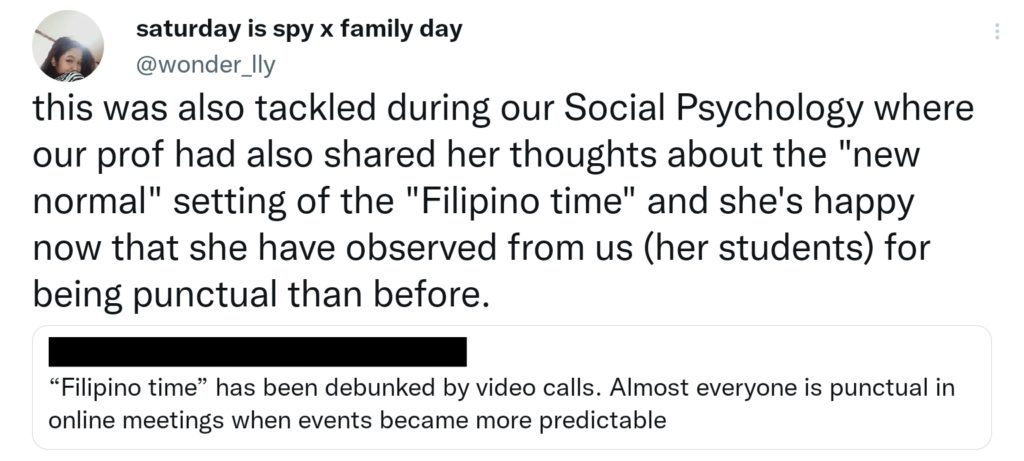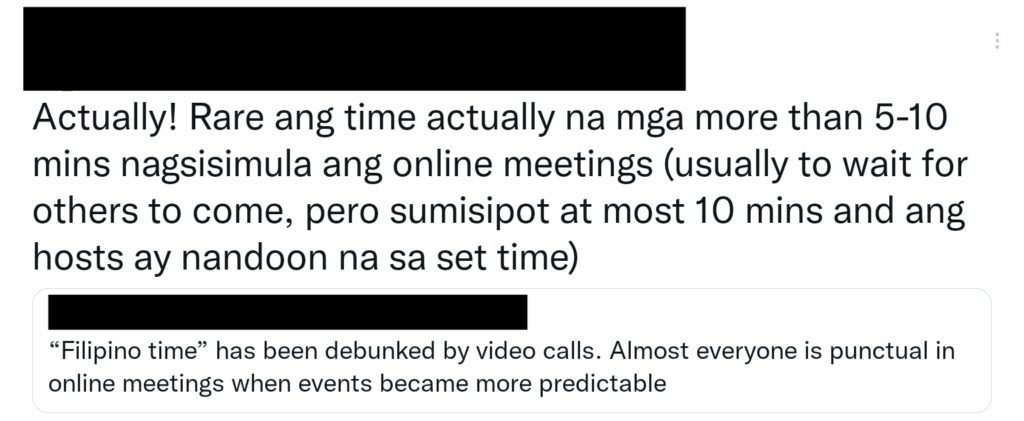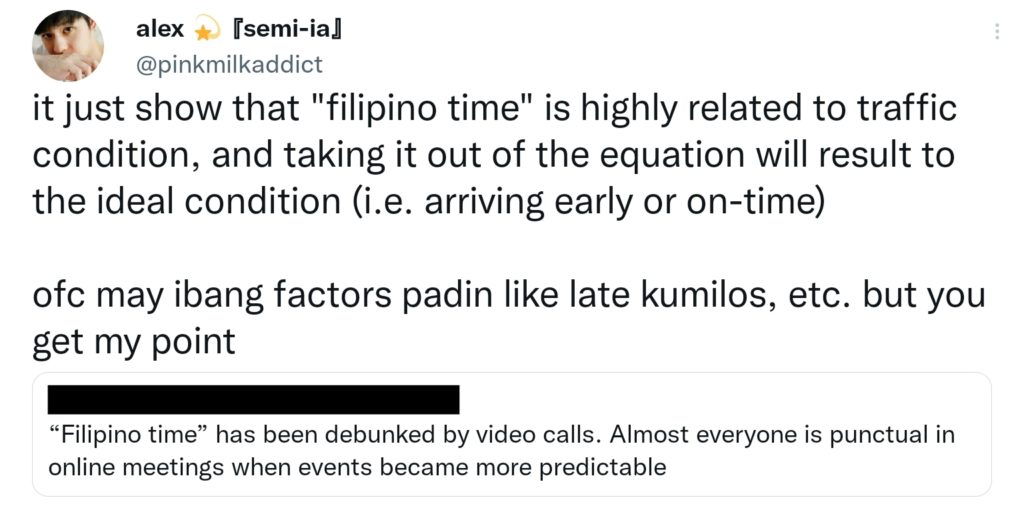Let’s admit it: we all have a point in our lives where we have arrived at “Filipino time.” Be it in our morning classes, during a meeting with a friend, or during a celebration, some of us have turned up a few minutes late even though we probably didn’t mean to be running behind schedule.
But when events and meetings shifted to online due to the onset of the pandemic, most of us began catching up with being on time.
This observation has been noticed by some users on Twitter, saying how “Filipino time has been debunked” by virtual meetings and how Filipinos have become more punctual in the said setup.



Other users have also pointed out that one of the many reasons why people arrived late is because of the country’s “inefficient public transportation system,” which we don’t have to come across during virtual meetings and events.



All of these points raised beg the question: Have we always been running late because some factors are hindering us from being on time?
To better understand the phenomenon of the “Filipino time,” POP! sat down with Dr. Jayeel Cornelio, a sociologist and the Associate Professor of Development Studies and the Associate Dean for Research and Creative Work at the Ateneo de Manila University.
Unpacking the “Filipino time”
“Filipino time” refers to starting things or arriving at meetings minutes and hours later than the set time. However, the concept of it has been in existence way back when colonizers were still settling in our country.
During the Spanish colonial period, being late became a status symbol. In fact, Jose Rizal even mentioned this practice in both of his works, Noli Me Tangere and El Filibusterismo, pointing out how latecomers were considered the most important ones.
But the term “Filipino time” only emerged during the American period after some Filipinos of high stature started to practice tardiness.
“‘Filipino time’, according to Jesuit Miguel Bernad, was coined by the Americans in disdain for Filipinos’ perennial tardiness,” Dr. Cornelio explained. “It is one of those colonially imposed ideas on Filipinos that we have internalized as our own cultural inadequacy.”
And as this concept has been carried through generations until it has become a habit in today’s society, there are legitimate reasons why most of us are still running late.
One of those is that there aren’t enough mechanisms and rules to ensure that we’ll get to our destination on time. Therefore, Filipino time has become a habit we practice now.
Looking at it through the lens of sociology, Dr. Cornelio explained that habits are “structurally formed.” “Meaning to say, habits are shaped by rules, the environment, and mechanisms that control them [the people],” he said.
He then added that if rules are being implemented consistently, people will behave in a particular way as there are certain rules in place that guarantee activities will start on time and people arrive early—just like in classes, church masses, meetings, and workplaces.
“For an extreme example, turn to Iglesia Ni Cristo, which closes its doors as soon as the service starts. From this point of view, if latecomers are all too common, perhaps it’s so not so much about culture [rather] it is [more about] the mechanisms that ensure people come on time.”
Another explanation for this is the existing class dimension among Filipinos. According to Dr. Cornelio, people who own private vehicles or are close to their workplaces have a huge advantage as they have the means to arrive on time and be early.
But for those who commute daily and rely on the country’s public transportation, theirs is a different story.
“You can’t say the same thing about those who rely on public transportation, especially because they are unreliable,” he explained. “The MRT bogs down, and expect chaos in the typhoon season.”
Dr. Cornelio then mentioned that status is among the reasons for Filipino time as people with higher status tend to come late for an event. He said: “People who are on time or early for an event are the unimportant ones. If it’s a politician, expect them to be late or totally unpredictable.”
He also recognized that those who choose to come late as well are one of the factors that can be attributed to Filipino time. He went on to share how he found this interesting yet troubling as it “has become a moral problem from which there seems to be no redemption anymore.”
Dr. Cornelio pointed out that this is not only just an individual problem, but Filipino time is also a structural problem that once we see from a wider perspective, we can think of ways to use our time and resources effectively.
“Who is in charge of starting on time? What do we do with latecomers? How can we incentivize punctuality and monitor it consistently?” said Dr. Cornelio. “Again, the system could be designed [for] tardiness [to be] disincentivized.”
Punctuality during the pandemic
Now that meetings and events are being held virtually—and without literal roadblocks blocking our way and waiting for self-important people for too long, have we improved and become more punctual during the pandemic?
For Dr. Cornelio, he believed that it depends. “I think it depends on which Filipino we are talking about. As I’ve said, you can expect punctuality if systems are in place.”
However, he noted that in moments when people are still expected to be productive or be optimistic during lockdowns, punctuality can be considered “tyrannical.”
“This is unhealthy […] In moments of crisis, people should be able to extend some leniency,” he said. “Now that we are all expected to work onsite once again, do we simply expect people to behave as we all did before the lockdowns? Or can we build on the strides that we have made to foster effective work arrangements without necessarily being onsite all the time?”
These questions Dr. Cornelio posed only reveal how punctuality can only be achieved not only through an individual’s effort but as well as a collective one. “While I understand that it boils down to personal discipline, we also need to recognize that punctuality is a collective effort,” said Dr. Cornelio.
So, what can we do to avoid becoming late?
According to Dr. Cornelio, the first thing we can do is to start catching up with being on time when it comes to meeting with our friends and groups. This way, we can show that we respect other people’s time.
He then suggested that at a societal level, we have to implement mechanisms that will help people travel with so much ease because “right now, commuting is an arduous task for the ordinary Filipino.”
Other POP! stories you might like:
Commentary: ‘It is your job, so do your job’: The sad reality for service workers
These ‘hot takes’ on Pinoy customs and traditions are honestly such eye-openers
Filipino Twitter users call for easy access to quality education in the PH

